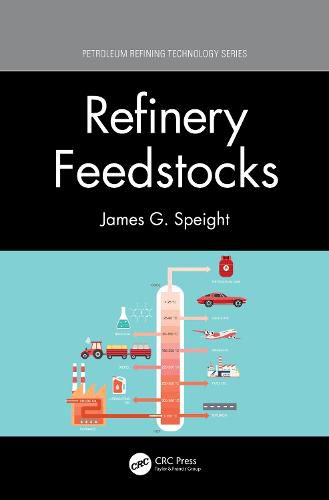Readings Newsletter
Become a Readings Member to make your shopping experience even easier.
Sign in or sign up for free!
You’re not far away from qualifying for FREE standard shipping within Australia
You’ve qualified for FREE standard shipping within Australia
The cart is loading…






Over the last several decades, the petroleum industry has experienced significant changes in resource availability, petro-politics, and technological advancements dictated by the changing quality of refinery feedstocks. However, the dependence on fossil fuels as the primary energy source has remained unchanged.
Refinery Feedstocks addresses the problems of changing feedstock availability and properties; the refining process; and solids deposition during refining. This book will take the reader through the various steps that are necessary for crude oil evaluation and refining including the potential for the use of coal liquids, shale oil, and non-fossil fuel materials (biomass) as refinery feedstocks.
Other features:
Describes the various types of crude oil and includes a discussion of extra heavy oil and tar sand bitumen
Includes basic properties and specifications of crude oil and the significance in refinery operations
This book is a handy reference for engineers, scientists, and students who want an update on crude oil refining and on the direction the industry must take to assure the refinability of various feedstocks and the efficiency of the refining processes in the next fifty years. Non-technical readers, with help from the extensive glossary, will also benefit from reading this book.
$9.00 standard shipping within Australia
FREE standard shipping within Australia for orders over $100.00
Express & International shipping calculated at checkout
Stock availability can be subject to change without notice. We recommend calling the shop or contacting our online team to check availability of low stock items. Please see our Shopping Online page for more details.
Over the last several decades, the petroleum industry has experienced significant changes in resource availability, petro-politics, and technological advancements dictated by the changing quality of refinery feedstocks. However, the dependence on fossil fuels as the primary energy source has remained unchanged.
Refinery Feedstocks addresses the problems of changing feedstock availability and properties; the refining process; and solids deposition during refining. This book will take the reader through the various steps that are necessary for crude oil evaluation and refining including the potential for the use of coal liquids, shale oil, and non-fossil fuel materials (biomass) as refinery feedstocks.
Other features:
Describes the various types of crude oil and includes a discussion of extra heavy oil and tar sand bitumen
Includes basic properties and specifications of crude oil and the significance in refinery operations
This book is a handy reference for engineers, scientists, and students who want an update on crude oil refining and on the direction the industry must take to assure the refinability of various feedstocks and the efficiency of the refining processes in the next fifty years. Non-technical readers, with help from the extensive glossary, will also benefit from reading this book.